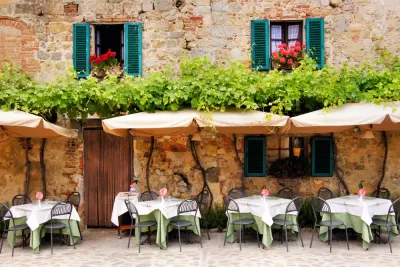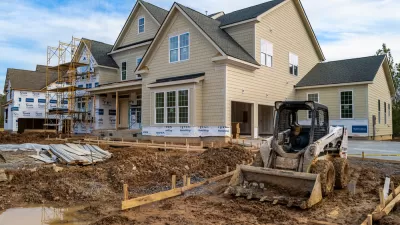In a review of Jonathan F.P. Rose's new book, 'The Well-Tempered City,' Chuck Wolfe enthusiastically endorses Rose's refreshing world view.

In a Huffington Post review, Chuck Wolfe describes how Jonathan F.P. Rose's new book, The Well-Tempered City, captures a life’s worth of experience and thinking of the prominent New York developer and philanthropist, and how Rose's seven years of applied work on the book is readily apparent.
Rose’s inspirational theme is Johann Sebastian Bach’s then-novel, 18th century system of tuning musical instruments in The Well-Tempered Clavier. He takes Bach’s premise of aligning human ideals with natural harmony, and applies it to urban progress and potential such as greening cities today.
Wolfe describes Rose's reliance on a Portland Sustainability Institute (now “Ecodistrict‘) graphic to show such ideals and harmony, and to explain Portland residents’ aspirations for a green, accessible and safe city, with places where people will want to spend their time:
But here’s a pleasant caveat: Rose’s points stem not from a developer’s “green-washing,” but from well-studied explanations in the book about humans, and how they are wired, dating from our common ancestors who evolved millions of years ago... After reading The Well-Tempered City, and speaking at length with Rose, I emerged with excitement and optimism, because with simple attention to his humanistic base, and concepts of vision, coherence and compassion, I saw how idealism and implementation merged. As a developer, Rose applied “the developer’s test” to his book’s ideas and found them workable—-and so do I.
With a volume full of implementation examples, he continues, it is easy to understand why, citing a key paragraph from the book's Introduction:
Imagine a city with Singapore’s social housing, Finland’s public education, Austin’s smart grid, the biking culture of Copenhagen, the urban food production of Hanoi, Florence’s Tuscan regional food system, Seattle’s access to nature, New York City’s arts and culture, Hong Kong’s subway system, Curitiba’s bus rapid transit system, Paris’s bike-share program, London’s congestion pricing, San Francisco’s recycling system, Philadelphia’s green stormwater program, Seoul’s Cheonggyecheon River restoration project, Windhoek’s wastewater recycling system, Rotterdam’s approach to living with rising seas, Tokyo’s health outcomes, the happiness of Sydney, the equality of Stockholm, the peacefulness of Reykjavík, the harmonic form of the Forbidden City, the market vitality of Casablanca, the cooperative industrialization of Bologna, the innovation of Medellín, the hospitals of Cleveland, and the livability of Vancouver. Each of these aspects of a well-tempered city exists today and is continually improving. Each evolved in its own place and time and is adaptable and combinable. Put them together as interconnected systems and their metropolitan regions will evolve into happier, more prosperous, regenerative cities.
In other words, Wolfe concludes, "if you worry that a lofty fascination with classical music is not the recipe for mediating concerns about urban density, affordability, access to public transit or climate change, fear not, because it’s all there."
FULL STORY: Why ‘The Well-Tempered City’ is a One-Stop, Urban Epic

Study: Maui’s Plan to Convert Vacation Rentals to Long-Term Housing Could Cause Nearly $1 Billion Economic Loss
The plan would reduce visitor accommodation by 25% resulting in 1,900 jobs lost.

Alabama: Trump Terminates Settlements for Black Communities Harmed By Raw Sewage
Trump deemed the landmark civil rights agreement “illegal DEI and environmental justice policy.”

Why Should We Subsidize Public Transportation?
Many public transit agencies face financial stress due to rising costs, declining fare revenue, and declining subsidies. Transit advocates must provide a strong business case for increasing public transit funding.

Paris Bike Boom Leads to Steep Drop in Air Pollution
The French city’s air quality has improved dramatically in the past 20 years, coinciding with a growth in cycling.

Why Housing Costs More to Build in California Than in Texas
Hard costs like labor and materials combined with ‘soft’ costs such as permitting make building in the San Francisco Bay Area almost three times as costly as in Texas cities.

San Diego County Sees a Rise in Urban Coyotes
San Diego County experiences a rise in urban coyotes, as sightings become prevalent throughout its urban neighbourhoods and surrounding areas.
Urban Design for Planners 1: Software Tools
This six-course series explores essential urban design concepts using open source software and equips planners with the tools they need to participate fully in the urban design process.
Planning for Universal Design
Learn the tools for implementing Universal Design in planning regulations.
Smith Gee Studio
Alamo Area Metropolitan Planning Organization
City of Santa Clarita
Institute for Housing and Urban Development Studies (IHS)
City of Grandview
Harvard GSD Executive Education
Toledo-Lucas County Plan Commissions
Salt Lake City
NYU Wagner Graduate School of Public Service





























